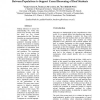Free Online Productivity Tools
i2Speak
i2Symbol
i2OCR
iTex2Img
iWeb2Print
iWeb2Shot
i2Type
iPdf2Split
iPdf2Merge
i2Bopomofo
i2Arabic
i2Style
i2Image
i2PDF
iLatex2Rtf
Sci2ools
AIED
2005
Springer
2005
Springer
The Use of Qualitative Reasoning Models of Interactions between Populations to Support Causal Reasoning of Deaf Students
Making inferences is crucial for understanding the world. The school may develop such skills but there are few formal opportunities for that. This paper describes an experiment designed to investigate the use of qualitative reasoning models to support deaf students in making inferences about the behaviour of populations in interactions such as commensalism, amensalism, and predation. The experiment was done in two sessions. In both, the teacher presented the concepts, which were translated to the signed language, and at the end the students answer to a test, consisting of objective questions and a written essay. In the second session qualitative models about the interactions were used to show the structure of the two populations system and the dynamics of the system over time. Statistical analysis showed that the use of qualitative models had a significant positive effect on the performance of the students. They gave more correct answers to objective questions and produced less trivia...
AIED 2005 | Artificial Intelligence | Qualitative Models | Qualitative Reasoning Models | Session Qualitative Models |
| Added | 26 Jun 2010 |
| Updated | 26 Jun 2010 |
| Type | Conference |
| Year | 2005 |
| Where | AIED |
| Authors | Paulo Salles, Heloisa Lima-Salles, Bert Bredeweg |
Comments (0)

